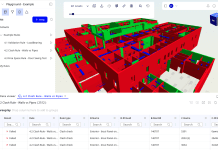Craig Taylor, associate director at Lungfish Architects considers how modular construction methods could be the key to speeding up residential infrastructure projects as the industry looks to find its feet
With 90% of construction sites in the UK now reopen, it’s inevitable that developers will need to look at new approaches to building to combat the recent fall in productivity, which will undoubtably cause many projects to overrun.
Against this backdrop, and to meet the government’s ambitious housebuilding targets, alongside its green recovery plans, there is an opportunity to accelerate the widespread adoption of modular construction methods across residential sites.
Clearly, lessons can be learnt from the completion of the UK’s Nightingale hospitals, demonstrating how modern methods of construction can be delivered on a large scale, and within a short timeframe. The recent lockdown has given a glimpse of the possibilities when modern technologies are allowed to flourish.
By embracing the rise in popularity of modular builds in recent years, coupled with its cost- advantages, developers can utilise offsite methods to bolster future projects as we look to build our way out of the pandemic.
Rise in popularity
The UK is still playing catch-up with its European counterparts when it comes to modular construction methods. In Sweden, it’s long been used for constructing housing, while Germany’s thriving modular market offers residential developments at numerous price points. Yet, according to Pinsent Mason, of the 200,000 homes built each year in the UK, only 15,000 are rolled off the factory floor.
Modular builds used to have negative associations with the low-quality, prefabricated homes of Britain’s post-war era. However, in recent times, the modern methods of construction are billed as an entirely different proposition that produce high-value and cost-efficient homes.
Quality is one of the biggest talking points as units are constructed in factory-controlled conditions, offering far more precision and capabilities in design and execution compared with traditional construction methods. Architects have a blank canvas to create a uniquely bespoke design to suit the client’s needs and requirements without many restrictions.
Understandably, there is a reluctance from well-established UK housebuilders to adopt this method in practical and financial terms. However, there’s definitely been more willingness from private developers and local authorities to explore modular methods, especially for affordable and build to rent (BTR) homes where it can offer a faster return on investment.
As the government aims to deliver 300,000 new homes every year by 2025 to fix what it admits is a broken housing market, modular construction has been actively promoted as a safer and quicker way to deliver new developments. Our recent commissioned work with Bassetlaw District Council to create 250 modular houses with eco-credentials is a prime example of this – enabling fast, cost-effective modular housing to be built across the UK.
Time and cost savings
One of the major attractions of the modular build process is its time-saving capacity and guaranteed scales of delivery. Reducing the amount of labour-intensive time spent on site by constructing the project under controlled plant conditions can significantly lessen the overall build time, making the project more time and cost-effective.
Modular construction also offers the opportunity to make significant reductions in operational and transportation-related costs. From the highly controlled production environment to a reduction in resources required for the installation, modular construction can have a positive impact on budget management – reducing overheads and saving time. Cost savings can then be passed through construction companies to potential homeowners, providing affordable accommodation that remains profitable for developers.
Cost certainty is an important factor too, especially when it comes to affordability. Modular allows developers to cost components up front and evaluate potential plots against tight budgets to a precise effect. The ease and speed of off-site construction methods can also allow developers to have full sight of the various project phases and have a clear picture of the progress from the factory floor to when the lorries arrive on site. Every modular build project will have a guaranteed period of time from concept to delivery that all parties can work towards.
Looking ahead
As we consider the future, the impact of coronavirus has strengthened the global commitment towards reducing carbon emissions, following several months of lockdown. Modular construction can be a vital component in this new future, as the industry looks to a play a lead role in the UK’s commitment to reaching net-zero carbon by 2050. For example, fewer deliveries are required with modular construction which will not only reduce a project’s carbon footprint but will also contribute towards lowering noise pollution.
Thanks to the methods and materials used in the construction, modular buildings also boast a high thermal efficiency rating, and in turn cost less to heat than the majority of traditional structures – further reducing a development’s carbon emissions.
In many respects, the lockdown has improved the lines of communication among businesses, both internally and with supporting organisations. Collaboration lies at the heart of modular design, with client engagement meetings acting as a key component to the success of any project to deliver unique results on-site.
From self-contained garden pods to lightweight structures for multi-storey accommodation, modular construction delivers a fast, efficient, sustainable and affordable option to the UK’s housebuilding market. The now-innovative methods associated with offsite construction may, before long, have a powerful positive impact on mainstream building processes – and go some way towards helping our government meet crucial housing targets.
Craig Taylor
Associate Director










![[Video] Fireco: 80 new fire doors required for residential flats in London](https://www.pbctoday.co.uk/news/wp-content/uploads/2025/04/2024-06-01-Lords-view-one_1200x750_004-218x150.webp)



